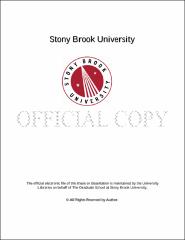| dc.identifier.uri | http://hdl.handle.net/11401/77561 | |
| dc.description.sponsorship | This work is sponsored by the Stony Brook University Graduate School in compliance with the requirements for completion of degree. | en_US |
| dc.format | Monograph | |
| dc.format.medium | Electronic Resource | en_US |
| dc.language.iso | en_US | |
| dc.publisher | The Graduate School, Stony Brook University: Stony Brook, NY. | |
| dc.type | Thesis | |
| dcterms.abstract | Twelfth Night is a play full of merrymaking, wish fulfillment and laughter because of its close relation to festivity in Elizabethan times. In the overall jolly atmosphere in the Twelfth Night, Malvolio is the one character in this play that acts as an opponent to revelry. This essay aims to study the festival theme in Twelfth Night, and Malvolio’s disruptive role in it. It includes a study of Malvolio’s understanding of himself, his changes through the development of the play and how those work on the audience especially his unresolved ending. I argue that though Malvolio is positioned as the opponent of revelry, he is in fact the unwitting center of the Twelfth Night revelry. His problematic exit is a way to shift focus of the audience from his silliness to his potential revenge, and thus dissolve his shame temporally. Shakespeare pushes the limits of comedy by creating possibility of danger, but finally comes back to the boundaries of comedy by giving Malvolio an exit from the stage. | |
| dcterms.abstract | Twelfth Night is a play full of merrymaking, wish fulfillment and laughter because of its close relation to festivity in Elizabethan times. In the overall jolly atmosphere in the Twelfth Night, Malvolio is the one character in this play that acts as an opponent to revelry. This essay aims to study the festival theme in Twelfth Night, and Malvolio’s disruptive role in it. It includes a study of Malvolio’s understanding of himself, his changes through the development of the play and how those work on the audience especially his unresolved ending. I argue that though Malvolio is positioned as the opponent of revelry, he is in fact the unwitting center of the Twelfth Night revelry. His problematic exit is a way to shift focus of the audience from his silliness to his potential revenge, and thus dissolve his shame temporally. Shakespeare pushes the limits of comedy by creating possibility of danger, but finally comes back to the boundaries of comedy by giving Malvolio an exit from the stage. | |
| dcterms.available | 2017-09-20T16:52:54Z | |
| dcterms.contributor | Videbaek, Bente | en_US |
| dcterms.creator | Huang, Lixian | |
| dcterms.dateAccepted | 2017-09-20T16:52:54Z | |
| dcterms.dateSubmitted | 2017-09-20T16:52:54Z | |
| dcterms.description | Department of English. | en_US |
| dcterms.extent | 40 pg. | en_US |
| dcterms.format | Application/PDF | en_US |
| dcterms.format | Monograph | |
| dcterms.identifier | http://hdl.handle.net/11401/77561 | |
| dcterms.issued | 2015-12-01 | |
| dcterms.language | en_US | |
| dcterms.provenance | Made available in DSpace on 2017-09-20T16:52:54Z (GMT). No. of bitstreams: 1
Huang_grad.sunysb_0771M_12647.pdf: 576604 bytes, checksum: ff2084f6188d9d39c67593f201fe2080 (MD5)
Previous issue date: 1 | en |
| dcterms.publisher | The Graduate School, Stony Brook University: Stony Brook, NY. | |
| dcterms.subject | English literature | |
| dcterms.title | Festivity and Malvolio in Twelfth Night | |
| dcterms.type | Thesis | |

